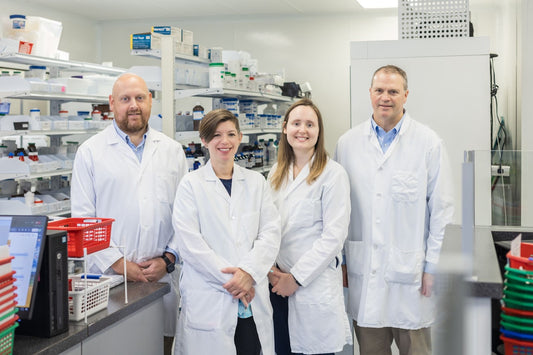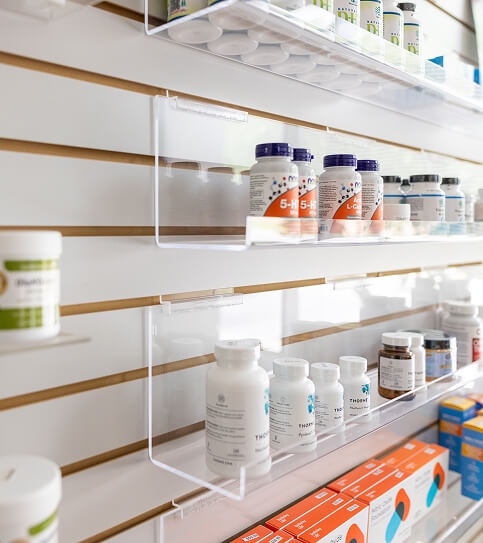
What is a Compounding Pharmacy?
In today's world, health care is becoming increasingly personalized. Individual patients need customized medicinal solutions. Compound pharmacies play a significant role in meeting these crucial requirements.
These are specialized pharmacies that cater to each patient's unique needs for various health conditions, providing customized medications that aren't available in standard pharmacies.
A report from the American Pharmacists Association states that there are approximately 56,000 community-based or retail pharmacies in the United States. Of these, about 5,700 are compounding pharmacies.
For people who wonder what a compound pharmacy is or how they differ from regular pharmacies, we have compiled this guide to answer all their questions.
We'll delve into what compounding pharmacies entail, their purposes, risks, and benefits, and explore why they can be a life-changing solution for many. If you are thinking of using compound pharmacy, here is what you need to know:
Definition: What is a Compounding Pharmacy?
A compounding pharmacy is a popular, specialized type of pharmacy that manufactures customized medications for you, your loved ones, or even your pet. It does so by combining, mixing, or altering ingredients to address the patient's condition.
Regular pharmacies dispense mass-manufactured drugs while compounding pharmacies offer personalized medicines specifically tailored to suit individual preferences or health conditions.
What are Compound Prescriptions?
Compound prescriptions are custom-made medications prepared by a pharmacist based on a doctor's specific instructions to meet the unique needs of every patient.
Origin of Compounding Pharmacies
The concept of compounding isn't new. It dates back to the origin of medicines itself. The history of compounding pharmacies relates to ancient civilizations, such as Mesopotamia, Egypt, and China, where healers crafted remedies from natural substances.
Notably, the Greek physician Galen advanced the practice by tailoring drug combinations to individual needs. In the medieval Islamic world, pharmacists used innovative compounding techniques, establishing the first drugstores.
The 19th century witnessed the rise of modern compounding with the isolation of compounds; however, mass production later diminished its prevalence.
Still, modern compounding pharmacies use advanced techniques and equipment. These ensure that the highest possible quality and safety standards are met.
Recently, interest in personalized medicine has revived the practice of compounding, leading to increased regulation and oversight to ensure safety and quality in pharmaceutical practices.
Services: What Do Compounding Pharmacies Do?
Compounding pharmacies prepare a wide range of medications to meet the unique needs of patients — from children and nursing mothers to individuals with chronic pain or hormone imbalances. The services include:
-
Adjusting Dosages: Creating medications and dosages that are not available in standard prescriptions.
-
Customizing Formulations: Changing a medication's form, such as turning a pill into a liquid or cream for easier administration.
-
Avoiding Allergens: Removing ingredients like dyes, gluten, or lactose to accommodate sensitivities.
-
Adding Flavors: Making medications more palatable, especially for children or pets.
-
Combining Medications: Merging multiple prescriptions into a single dose for convenience.
These services ensure that patients receive treatments tailored to their unique physiology and preferences.
When Might You Need a Compounding Pharmacy?
There are many scenarios where a compounding pharmacy can be life-changing:
-
If you're allergic to ingredients like dyes, preservatives, or fillers in mass-manufactured drugs, a compounding pharmacy can create a safer alternative.
-
Children often struggle with standard medications due to taste or difficulty swallowing pills. Flavored or liquid medications from compounding pharmacies solve this problem.
-
Older adults may require medications in more user-friendly forms, such as topical creams or liquids.
-
When a manufacturer discontinues a drug, a compounding pharmacy can reproduce it.
-
Many patients rely on compounded bioidentical hormones for customized Hormone Replacement Therapy (HRT).
Compounding pharmacies bridge the gap when commercial medications fall short, ensuring no one is left without the care they need.
Is it Possible to Know if Compounded Drugs are Safe and Potent?
Yes, but it requires due diligence. Get some tips to ensure safety:
-
Check accreditation. Look for a pharmacy accredited by the Pharmacy Compounding Accreditation Board (PCAB) or similar organizations.
-
Ask about quality standards. Reputable pharmacies will follow USP (United States Pharmacopeia) guidelines for compounding.
-
Consult the pharmacist. A knowledgeable pharmacist will address your questions and explain how the medication is prepared.
When you work with a trusted provider, you will feel confident that your compounded medications are both safe and effective. They will help you live fully and enjoy being healthy and functional again.
How is a Compounding Pharmacy Different from a Regular Pharmacy?
The primary difference lies in customization. Regular pharmacies dispense pre-manufactured medications while compounding pharmacies create bespoke solutions. This flexibility makes compounding pharmacies an essential resource for patients with unique medical needs.
Compounding Pharmacy vs. Regular Pharmacy
|
Feature |
Compounding Pharmacy |
Regular Pharmacy |
|
Customized Medications |
Yes |
No |
|
Fills Standard Prescriptions |
Sometimes |
Yes |
|
Allergy-Friendly Options |
Yes |
Limited |
|
Form and Dosage Flexibility |
Yes |
No |
What are the Different Kinds of Compounded Medications?
Compounding pharmacies can create numerous formulas that a pharmacist or physician can follow to prepare compounded medications. These can be made from bulk ingredients, commercial drug products, or their combination.
Here are some of the most commonly compounded formulations used across different age groups and medical conditions:
1. Hormone Replacement Therapy (HRT)

Compounded hormone creams, capsules, and suppositories containing estradiol and progesterone are frequently prescribed for personalized hormone replacement therapy. These customized treatments are ideal for patients seeking bioidentical hormone options not available in standard commercial forms.
2. Pain Management Creams and Gels
Multi-ingredient topical pain creams are widely used to treat chronic or localized pain. These may include a combination of analgesics, anti-inflammatories, and muscle relaxants tailored to the patient's specific condition. Compounded diazepam suppositories are also used for managing chronic pelvic pain.
3. Dermatological and Nursing Care Formulations
Compounded dermatological creams are specifically designed to address skin concerns such as acne, psoriasis, or eczema. Topical nipple ointments offer soothing relief for irritation caused by breastfeeding, providing gentle and practical support for nursing mothers.
4. Liquid Medications
Liquid formulations are ideal for children, elderly patients, or pets who struggle with swallowing pills. Examples include omeprazole or lansoprazole liquids for pediatric reflux and other gastric concerns.
5. Suppositories
Suppositories provide targeted medication delivery, often used for rectal or vaginal administration. Rectal suppositories are commonly compounded for conditions such as hemorrhoids or anal fissures, offering faster relief with localized effects.
6. Flavoured and Palatable Medications
To improve patient compliance, especially among children or those with taste sensitivity, pharmacists often compound flavored medications. These versions maintain efficacy while enhancing the experience.
7. Magic Mouthwash
A well-known compounded solution, Magic Mouthwash combines several ingredients to relieve oral pain and inflammation and is often used in cancer care or for severe mouth ulcers.
8. Veterinary Compounds
Compounded medications for animals are tailored to meet the unique needs of pets, whether it's a chewable treat or a transdermal gel.
9. Sterile Antibiotic Eye Drops
Prepared in sterile environments to treat eye infections when commercial options are unsuitable or unavailable. These formulations are crucial for patients with allergies or sensitivities or those who are resistant to standard treatments.
10. Sterile Nutrition Therapy Infusions
Intravenous nutrition compounds tailored for patients with unique dietary or absorption needs are often used in hospital or clinical care settings under medical supervision.
Are there Different Types of Compounding Pharmacies?
Yes, there are two main types:
-
Traditional Compounding Pharmacies: These handle individual prescriptions and typically serve local communities.
-
Outsourcing Facilities: Larger facilities that produce compounded drugs in bulk for hospitals and clinics.
For personalized care, traditional compounding pharmacies are the ideal choice.
Compounding Pharmacy Regulations

Compounding pharmacies are regulated by:
-
State Boards of Pharmacy: Oversee licensing and compliance with state-specific rules.
-
FDA (Food and Drug Administration): The FDA does play a role, but not in full oversight of all compounding pharmacies. Traditional compounding pharmacies (503A) are primarily regulated by state boards, while 503B outsourcing facilities are FDA-registered and subject to stricter FDA regulations.
-
USP Standards: Provide guidelines for safe and effective compounding practices.
Triangle Compounding Pharmacy is nationally accredited and adheres to the highest industry standards.
Do Compounding Pharmacists have Education in Making Custom Medicines?
Yes, compounding pharmacists undergo extensive education and training. They learn:
-
Advanced pharmaceutical techniques.
-
How to calculate precise dosages.
-
Safe handling of active ingredients.
Reasons for Compounding in Pharmacy
Compounding offers solutions for:
-
Unique medical needs that mass-produced drugs can't address.
-
Custom dosages for children, pets, or patients with chronic conditions.
-
Restoring access to discontinued medications.
Do Compounded Drugs Cost More than Manufactured Drugs?
The cost of compounded medications varies depending on the ingredients, complexity, and quantity. While they may be more expensive than standard drugs, the value they provide in improving health and quality of life often outweighs the cost.
How Can I Find a Compounding Pharmacy Near Me?
To find a trusted compounding pharmacy, look for:
-
Accreditation from reputable organizations.
-
Positive reviews and testimonials.
-
Clear communication about pricing, processes, and safety measures.
If you're in North Carolina, Triangle Compounding is your local source for high-quality compounded medications.
The Bottom Line
Compounding, at its core, is more than making personalized medicine. It's the process of ensuring every patient receives the best care they deserve.
Compounding pharmacies provide a life-changing solution for patients with unique health needs. By customizing medications, they ensure better outcomes for conditions that standard prescriptions can't address.
Take control of your health with Triangle Compounding, where you can get customized, high-quality solutions.
Ready to Experience the Benefits of Compounded Medications?
At Triangle Compounding, we're proud to offer personalized compounded medications of the highest quality tailored to your specific needs. Our pharmacists and technicians are highly skilled in the art and science of compounding, ensuring every prescription is prepared with precision and care.
Whether you're managing chronic conditions, seeking allergy-friendly options, or require a customized formulation, our team has the expertise and heartfelt care to help.
Contact us today to discover how we can enhance your health and overall quality of life.
💊 Compounded Drugs: Frequently Asked Questions (FAQs)
1. Why do some patients need compounded drugs?
Compounded drugs are used when a patient can't take FDA-approved medications such as children who need liquid forms or patients who are allergic to certain ingredients. They're also vital during drug shortages or when commercial options are unsuitable.
2. Are compounded drugs FDA-approved?
No. The FDA does not review compounded drugs for safety, effectiveness, or high quality before they are marketed.
3. Are compounded drugs the same as generics?
No. Generic drugs are FDA-approved and proven equivalent to brand-name drugs. Compounded medications are custom-made and not FDA-approved.
4. What are the risks of compounded medications?
Improper compounding can lead to contamination, incorrect dosing, or the production of substandard products, which can cause serious health issues or even be fatal. Compounded drugs should only be used by a compounding pharmacy that adheres to regulations that maintain the highest quality standards.
5. Who can compound drugs?
Only licensed pharmacists or physicians in state-licensed pharmacies or federal facilities. Registered 503B outsourcing facilities can also compound drugs under strict FDA oversight.
6. Who inspects compounding facilities?
State pharmacy boards inspect most pharmacies. The FDA inspects outsourcing facilities and also conducts inspections of traditional pharmacies as needed.
7. What quality standards apply?
503B outsourcing facilities must follow current Good Manufacturing Practices (cGMP). Other compounders follow different standards but must avoid unsanitary conditions, as mandated by federal law.
8. Is it safe to buy compounded drugs online?
Only if the source is licensed and regulated. Buying from unverified online pharmacies can be a risky endeavor. Visit BeSafeRx for tips on safe online purchases.
9. Can telehealth companies promote compounded drugs?
Yes, but all promotions must be truthful and non-misleading. The FDA monitors promotional content for compliance with regulations.
10. Can biologics be compounded?
No. Biologics must go through a separate FDA approval process. Compounding biologics without a biologics license is not permitted by federal law.
Recent Articles

What is Hormone Replacement Therapy?
Hormones are mighty messengers in the body. They control everything from mood...
What is Hormone Replacement Therapy?
Hormones are mighty messengers in the body. They control everything from mood...

What is a Compounding Pharmacy?
In today's world, health care is becoming increasingly personalized. Individual patients need...
What is a Compounding Pharmacy?
In today's world, health care is becoming increasingly personalized. Individual patients need...

What Causes Erectile Dysfunction?
Erectile dysfunction (ED), commonly known as impotence, is a condition where a...
What Causes Erectile Dysfunction?
Erectile dysfunction (ED), commonly known as impotence, is a condition where a...




